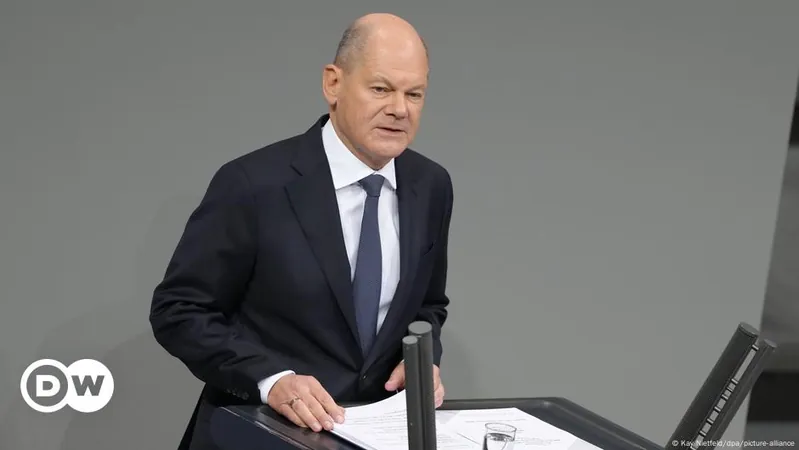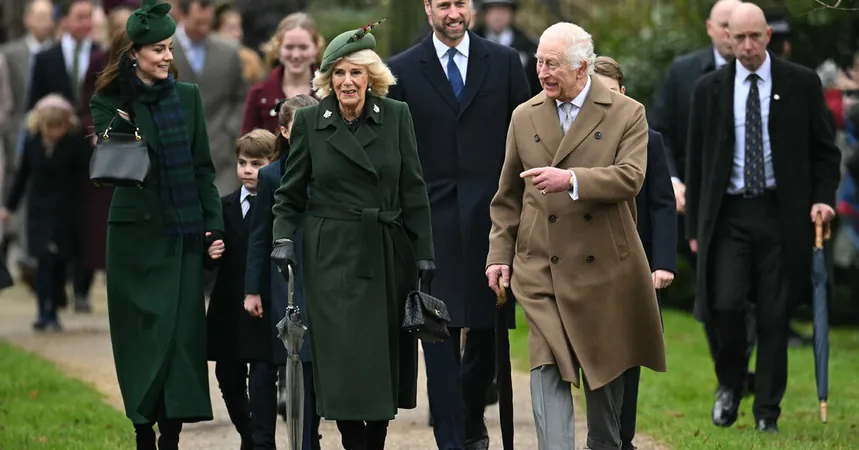
German Chancellor Scholz Faces Major Setback as Confidence Vote Fails – What’s Next for Germany?
2024-12-16
Author: Kai
In a dramatic turn of events on December 16, 2024, German Chancellor Olaf Scholz lost a pivotal confidence vote in the Bundestag, marking a significant collapse of his coalition government. Facing mounting pressure and declining public support, Scholz's Social Democrats (SPD) found themselves trailing Friedrich Merz's Christian Democratic Union (CDU) in the polls. The confidence vote has now set the stage for snap elections, expected to take place on February 23, 2025.
Following the loss of support from the Free Democrats (FDP), which had been part of his coalition alongside the SPD and the Greens, Scholz made his way to Bellevue Palace to propose the dissolution of the Bundestag. German President Frank-Walter Steinmeier is anticipated to approve this request and has already signaled his agreement with the proposed election date, despite noting that he plans to consult with various parliamentary groups before making an official announcement.
The vote saw 394 lawmakers casting their ballots against Scholz's government, while only 207 voted in favor, a stark indication of the government’s waning influence, especially after 116 others opted to abstain. This dramatic loss has spurred criticism from various political factions, indicating widespread dissatisfaction with current leadership.
Opposition leaders seized the moment to speak out against the Scholz administration's perceived failures. Alice Weidel, head of the Alternative for Germany (AfD) party, accused Scholz of damaging the economy and questioned the intelligence behind the coalition’s strategic decisions, particularly concerning Germany's energy policies. The economic landscape continues to be a focal point of outrage, with critics citing "massive lacking investment" in key sectors like the automotive industry, exacerbating the country's economic troubles.
Moreover, members of the Left Party and the BSW criticized Scholz for worsening conditions in Germany, labeling the government’s term as a time of decline. The sentiment was echoed by former Finance Minister Christian Lindner, who criticized Scholz's proposed policies as insufficient and disconnected from the current economic realities. He contended that the government’s approach lacks the necessary urgency to counter rising inflation and energy prices.
In his defense during the vote, Scholz highlighted several proposed initiatives aimed at economic recovery, including slashing the Value-Added Tax (VAT) on food and increasing the minimum wage to €15. He emphasized the need for substantial investment in defense and infrastructure to confront both external threats and ensure economic stability.
As November's soaring inflation and economic crisis loom over the impending elections, Scholz's government finds itself at a critical junction. With parties like the CDU gaining momentum, the results of the upcoming elections could redefine Germany's political landscape. Voter sentiments remain volatile, partly due to the ongoing debates surrounding migration and the impacts of the war in Ukraine on Germany’s security policies.
For now, optics matter as the SPD gears up for what could be a difficult campaign. The loss of the confidence vote has undoubtedly reignited discussions about the future direction of Germany’s political dynamics, with all eyes on the rival parties as they prepare for a fierce electoral battle in February. With the stakes higher than ever, the unfolding situation promises to reveal whether Scholz can salvage his political ambitions or if voters will opt for a change in leadership amidst the ongoing crises.




 Brasil (PT)
Brasil (PT)
 Canada (EN)
Canada (EN)
 Chile (ES)
Chile (ES)
 España (ES)
España (ES)
 France (FR)
France (FR)
 Hong Kong (EN)
Hong Kong (EN)
 Italia (IT)
Italia (IT)
 日本 (JA)
日本 (JA)
 Magyarország (HU)
Magyarország (HU)
 Norge (NO)
Norge (NO)
 Polska (PL)
Polska (PL)
 Schweiz (DE)
Schweiz (DE)
 Singapore (EN)
Singapore (EN)
 Sverige (SV)
Sverige (SV)
 Suomi (FI)
Suomi (FI)
 Türkiye (TR)
Türkiye (TR)